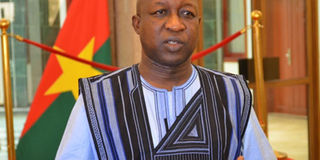Burkina Faso PM, cabinet resign

President Kabore chose experienced economist Paul Kaba Thieba as prime minister in January 2016
What you need to know:
- Canadian Edith Blais, 34, and her Italian partner Luca Tacchetto, 30, have been missing since mid-December, and late Wednesday a Canadian geologist kidnapped by suspected jihadists was found dead at a remote gold mine in the northeast.
- Jihadist raids began in northern Burkina Faso in 2015 before spreading to the east, near the border with Togo and Benin.
Burkina Faso's government and Prime Minister Paul Kaba Thieba stood down on Friday, according to a statement released by the country's president.
No explanation was given for the resignations, though sources said President Roch Marc Christian Kabore wants to breathe new life into the leadership of the landlocked west African country, which is battling a rising wave of jihadist attacks and hostage-taking.
Canadian Edith Blais, 34, and her Italian partner Luca Tacchetto, 30, have been missing since mid-December, and late Wednesday a Canadian geologist kidnapped by suspected jihadists was found dead at a remote gold mine in the northeast.
"Prime Minister Paul Kaba Thieba submitted this afternoon his resignation as well as that of his government," the statement said.
"The president of Faso accepted the resignation" and expressed "all his gratitude to Prime Minister Paul Kaba Thieba and all its ministers for their commitment to the service of the nation," the statement added.
President Kabore chose experienced economist Thieba as prime minister in January 2016. However, in recent months several political opponents have been calling for his resignation and that of ministers in charge of security and defence.
Burkina Faso lies in the heart of the vast Sahel region, which is struggling with a bloody Islamist insurgency.
The region turned into a hotbed of violent extremism and lawlessness after chaos engulfed Libya in 2011.
An Islamist insurgency began in northern Mali, while Boko Haram rose in northern Nigeria.
Jihadist raids began in northern Burkina Faso in 2015 before spreading to the east, near the border with Togo and Benin.
Canadian woman missing in west Africa believed to be alive
Prime Minister Justin Trudeau said Friday that Blais and Tacchetto are believed to be alive.

In this handout photograph released on January 17, 2019 from the Facebook page dedicated to their disappearance, Luca Tacchetto (L) and Edith Blais (R) pose for a selfie picture.
"To the best of my knowledge, yes," Trudeau said in response to a reporter's question.
"With all that I know so far, I have not been told anything else other than that she is believed to be alive."
The Canadian government said earlier it was leaving no stone unturned as it tries to determine what exactly happened to Blais and Tacchetto.
The pair were last seen on December 15 traveling by car in Burkina Faso between the town of Bobo-Dioulasso and the capital Ouagadougou, for a four- or five-day stay.
Kidnappings have increased in the impoverished Sahel state, which has been battling a rising wave of jihadist attacks over the last three years.
A Canadian travel warning had reported a risk of banditry and kidnapping in the area.
Late Wednesday, a Canadian geologist kidnapped at a remote gold mine in northeast Burkina Faso by suspected jihadists was found dead.
Blais and Tacchetto were working on a reforestation project with aid group Zion'Gaia.
Investigators on the ground have found no clues in their disappearance, but a senior Canadian official told AFP on condition of anonymity that they may have fallen victim to a kidnapping or a robbery gone awry.
"All options are being explored," Canadian International Development Minister Marie-Claude Bibeau said after meeting Friday with Blais' family in Quebec province.
"We are doing everything we can," she said.
Burkino Faso is in the front line of a jihadist rebellion in the Sahel, a vast, dusty region on the southern rim of the Sahara.
Canada has 250 soldiers and eight army helicopters deployed in neighboring Mali as part of a UN peacekeeping mission.
After chaos engulfed Libya in 2011, an Islamist insurgency gained ground in northern Mali, while Boko Haram rose in northern Nigeria.
Jihadist raids began in northern Burkina Faso in 2015 before spreading to the east, near the border with Togo and Benin.
Most of the attacks have been attributed to Ansarul Islam and the Group to Support Islam and Muslims (JNIM).
Smaller groups are also active, with the overall number of fighters estimated to be in the hundreds, according to security sources.
The groups are believed to be responsible for more than 270 deaths since 2015.
Ouagadougou has been hit three times, including a coordinated attack last March that targeted the French embassy and devastated the country's military headquarters.
Eight foreigners have been abducted in the last four years, according to an AFP tally.
Among them is 84-year-old Australian doctor Kenneth Elliott, who was kidnapped with his wife Jocelyn in April 2015 in Djibo, where the pair ran a clinic for the poor.
Jocelyn Elliott was released after a year. Her husband, whose whereabouts remain unknown, has been declared a citizen of Burkina Faso, under a decree issued last November.




